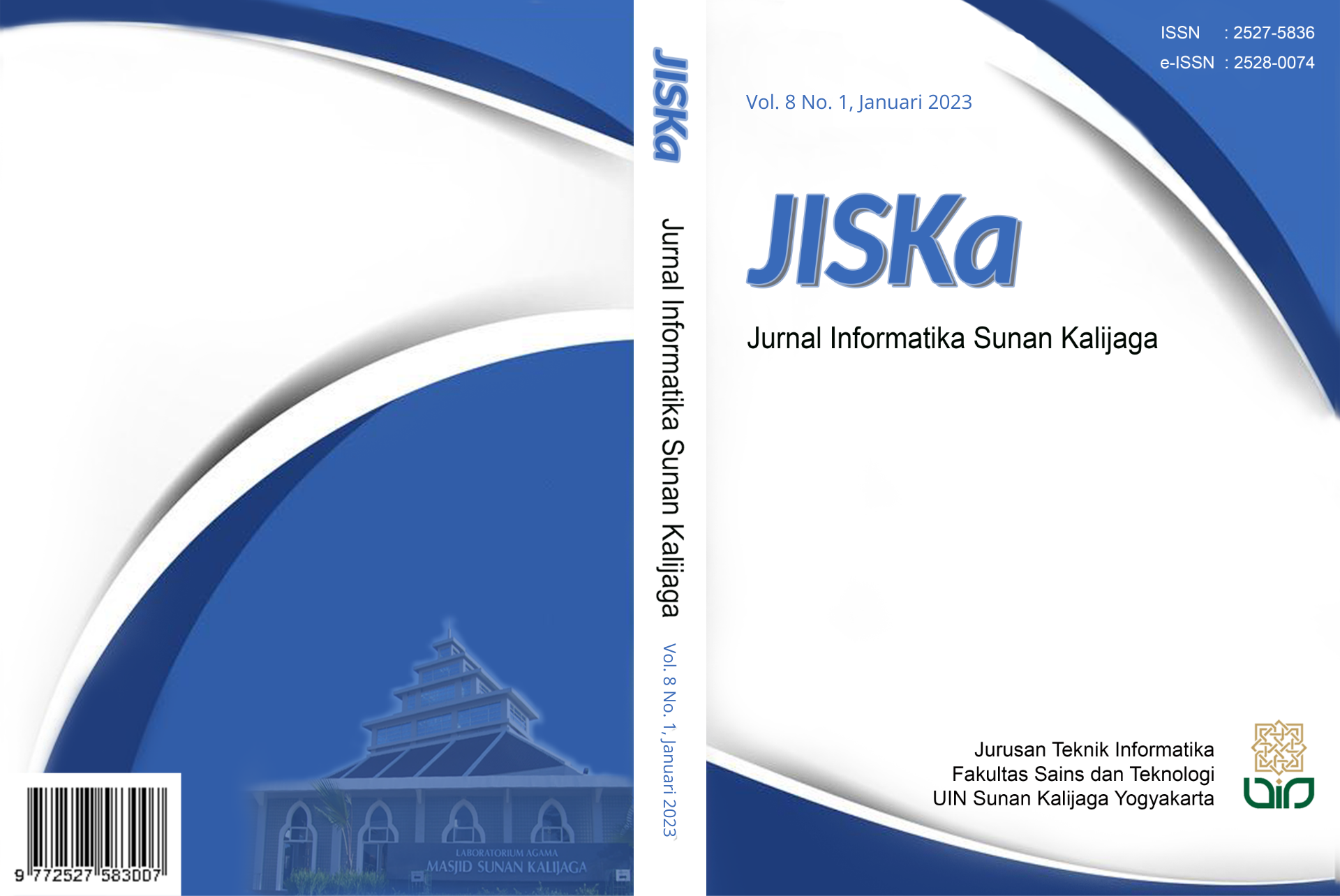Analisa Deteksi dan Pengenalan Wajah pada Citra dengan Permasalahan Visual
DOI:
https://doi.org/10.14421/jiska.2023.8.1.78-89Keywords:
Face, Detection, Recognition, Digital Image, Visual ProblemsAbstract
Facial recognition is a significant part of criminal investigations because it may be used to identify the offender when the criminal's face is consciously or accidentally recorded on camera or video. However, a majority of these digital photos have poor picture quality, which complicates and lengthens the process of identifying a face image. The purpose of this study is to discover and identify faces in these low-quality digital photographs using the Principal Component Analysis (PCA) and Linear Discriminant Analysis (LDA) face identification method and the Viola-Jones face recognition method. The success percentage for the labeled face in the wild (LFW) dataset is 63.33%, whereas the success rate for face94 is 46.66%, while LDA is only a maximum of 20% on noise and brightness. One of the names and faces from the dataset is displayed by the facial recognition system. The brightness of the image, where the facial item is located, and any new objects that have entered the scene have an impact on the success rate.
References
Aggarwal, A., Alshehri, M., Kumar, M., Sharma, P., Alfarraj, O., & Deep, V. (2021). Principal component analysis, hidden Markov model, and artificial neural network inspired techniques to recognize faces. Concurrency and Computation: Practice and Experience, 33(9), e6157. https://doi.org/10.1002/cpe.6157
Al-Ghrairi, A. H. T., Mohammed, A. A., & Sameen, E. Z. (2022). Face detection and recognition with 180 degree rotation based on principal component analysis algorithm. IAES International Journal of Artificial Intelligence (IJ-AI), 11(2), 593. https://doi.org/10.11591/ijai.v11.i2.pp593-602
Anam, M. K. (2020). 82 Metode Eigenface/Principle Component Analysis (PCA) Untuk Identifikasi Wajah Manusia. Jutis (Jurnal Teknik Informatika), 6(2), 82–88. https://doi.org/https://doi.org/10.33592/jutis.Vol6.Iss2.133
Ariza-Lopez, F. J., Rodriguez-Avi, J., & Alba-Fernandez, M. V. (2018). Complete Control of an Observed Confusion Matrix. IGARSS 2018 - 2018 IEEE International Geoscience and Remote Sensing Symposium, 2018-July, 1222–1225. https://doi.org/10.1109/IGARSS.2018.8517540
Barnouti, N. H., Al-Mayyahi, M. H. N., & Al-Dabbagh, S. S. M. (2018). Real-Time Face Tracking and Recognition System Using Kanade-Lucas-Tomasi and Two-Dimensional Principal Component Analysis. 2018 International Conference on Advanced Science and Engineering (ICOASE), 24–29. https://doi.org/10.1109/ICOASE.2018.8548818
Borade, S. N., Deshmukh, R. R., & Shrishrimal, P. (2016). Effect of distance measures on the performance of face recognition using principal component analysis. Advances in Intelligent Systems and Computing, 384, 569–577. https://doi.org/10.1007/978-3-319-23036-8_50/COVER
Cintisa, N., Suhartono, E., & Aulia, S. (2019). Pengenalan Ekspresi Pada Raut Wajah Pada Keselamatan Berkendara Menggunakan Principal Component Analysis (pca) Dan Linear Discriminant Analysis (lda). EProceedings of Engineering, 6(3). https://doi.org/10.34818/EOE.V6I3.11354
Darmawan, A. (2019). Aplikasi Mobile Pengenalan Wajah Secara Real-Time Berbasis Principal Component Analysis. Ubiquitous: Computers and Its Applications Journal, 2(1), 57–66. https://doi.org/10.51804/ucaiaj.v2i1.57-66
ElSayed, A., Mahmood, A., & Sobh, T. (2017). Effect of Super Resolution on High Dimensional Features for Unsupervised Face Recognition in the Wild. 2017 IEEE Applied Imagery Pattern Recognition Workshop (AIPR), 2017-October, 1–5. https://doi.org/10.1109/AIPR.2017.8457967
Furht, B., Akar, E., & Andrews, W. A. (2018). Digital Image Processing: Practical Approach. Springer International Publishing. https://doi.org/10.1007/978-3-319-96634-2
George, G., Oommen, R. M., Shelly, S., Philipose, S. S., & Varghese, A. M. (2018). A Survey on Various Median Filtering Techniques For Removal of Impulse Noise From Digital Image. 2018 Conference on Emerging Devices and Smart Systems (ICEDSS), 235–238. https://doi.org/10.1109/ICEDSS.2018.8544273
Goilkar, S. S., & Yadav, D. M. (2021). Implementation of Blind and Non-blind Deconvolution for Restoration of Defocused Image. 2021 International Conference on Emerging Smart Computing and Informatics (ESCI), 560–563. https://doi.org/10.1109/ESCI50559.2021.9397046
Gonzalez, R. C., & Woods, R. E. (2018). Digital Image Processing (4th ed). Pearson.
Jalal, A. S., Bhatnagar, C., Khan, Mohd. A., & Solanki, M. S. (2016). LBP based face recognition system for multi-view face using single sample per person. 2016 11th International Conference on Industrial and Information Systems (ICIIS), 2018-January, 414–419. https://doi.org/10.1109/ICIINFS.2016.8262976
Knoche, M., Hormann, S., & Rigoll, G. (2021). Cross-Quality LFW: A Database for Analyzing Cross- Resolution Image Face Recognition in Unconstrained Environments. 2021 16th IEEE International Conference on Automatic Face and Gesture Recognition (FG 2021), 1–5. https://doi.org/10.1109/FG52635.2021.9666960
Kosasih, R. (2021). Pengenalan Wajah Menggunakan PCA dengan Memperhatikan Jumlah Data Latih dan Vektor Eigen. Jurnal Informatika Universitas Pamulang, 6(1), 1. https://doi.org/10.32493/informatika.v6i1.7261
Lu, W., & Yang, M. (2019). Face Detection Based on Viola-Jones Algorithm Applying Composite Features. 2019 International Conference on Robots & Intelligent System (ICRIS), 82–85. https://doi.org/10.1109/ICRIS.2019.00029
Matin, A., Mahmud, F., & Shawkat, M. T. B. (2016). Recognition of an individual using the unique features of human face. 2016 IEEE International WIE Conference on Electrical and Computer Engineering (WIECON-ECE), 57–60. https://doi.org/10.1109/WIECON-ECE.2016.8009087
Moradmand, H., Aghamiri, S. M. R., & Ghaderi, R. (2020). Impact of image preprocessing methods on reproducibility of radiomic features in multimodal magnetic resonance imaging in glioblastoma. Journal of Applied Clinical Medical Physics, 21(1), 179–190. https://doi.org/10.1002/acm2.12795
Oktavianto, B., & Purboyo, T. W. (2018). A Study of Histogram Equalization Techniques for Image Enhancement. International Journal of Applied Engineering Research, 13(2), 1165–1170. http://www.ripublication.com
Proenca, H., Neves, J. C., Barra, S., Marques, T., & Moreno, J. C. (2016). Joint Head Pose/Soft Label Estimation for Human Recognition In-The-Wild. IEEE Transactions on Pattern Analysis and Machine Intelligence, 38(12), 2444–2456. https://doi.org/10.1109/TPAMI.2016.2522441
Singh, G., & Goel, A. K. (2020). Face Detection and Recognition System using Digital Image Processing. 2020 2nd International Conference on Innovative Mechanisms for Industry Applications (ICIMIA), 348–352. https://doi.org/10.1109/ICIMIA48430.2020.9074838
Tang, C., Cai, A., Zhang, W., Zheng, Z., Liang, N., Li, L., & Yan, B. (2020). Joint Regularized-based Image Reconstruction by Combining Super-Resolution Sinogram for Computed Tomography Imaging. 2020 5th International Conference on Communication, Image and Signal Processing (CCISP), 188–193. https://doi.org/10.1109/CCISP51026.2020.9273488
Viola, P., & Jones, M. (2001). Rapid object detection using a boosted cascade of simple features. Proceedings of the 2001 IEEE Computer Society Conference on Computer Vision and Pattern Recognition. CVPR 2001, 1, I-511-I–518. https://doi.org/10.1109/CVPR.2001.990517
Xiong, W. (2020). Research on Fire Detection and Image Information Processing System Based on Image Processing. 2020 International Conference on Advance in Ambient Computing and Intelligence (ICAACI), 106–109. https://doi.org/10.1109/ICAACI50733.2020.00027
Downloads
Published
Issue
Section
License
Copyright (c) 2023 Verry Noval Kristanto, Imam Riadi, Yudi Prayudi

This work is licensed under a Creative Commons Attribution-NonCommercial 4.0 International License.
Authors who publish with this journal agree to the following terms as stated in http://creativecommons.org/licenses/by-nc/4.0
a. Authors retain copyright and grant the journal right of first publication with the work simultaneously licensed under a Creative Commons Attribution License that allows others to share the work with an acknowledgement of the work's authorship and initial publication in this journal.
b. Authors are able to enter into separate, additional contractual arrangements for the non-exclusive distribution of the journal's published version of the work (e.g., post it to an institutional repository or publish it in a book), with an acknowledgement of its initial publication in this journal.
c. Authors are permitted and encouraged to post their work online (e.g., in institutional repositories or on their website) prior to and during the submission process, as it can lead to productive exchanges, as well as earlier and greater citation of published work.










